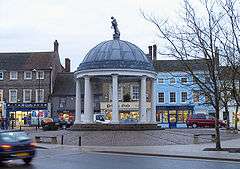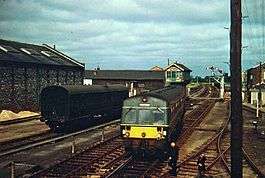Swaffham
Swaffham (/ˈswɒfəm/) is a market town and civil parish in the Breckland District and English county of Norfolk. It is situated 12 miles (19 kilometres) east of King's Lynn and 31 miles (50 kilometres) west of Norwich.
| Swaffham | |
|---|---|
 The Buttercross Swaffham market place | |
 Swaffham Location within Norfolk | |
| Area | 29.6 km2 (11.4 sq mi) |
| Population | 7,258 (2011)[1] |
| • Density | 245/km2 (630/sq mi) |
| OS grid reference | TF815095 |
| Civil parish |
|
| District |
|
| Shire county | |
| Region | |
| Country | England |
| Sovereign state | United Kingdom |
| Post town | SWAFFHAM |
| Postcode district | PE37 |
| Dialling code | 01760 |
| Police | Norfolk |
| Fire | Norfolk |
| Ambulance | East of England |
| UK Parliament | |
| Website | Town council |
The civil parish has an area of 11.42 sq mi (29.6 km2) and in the 2001 census had a population of 6,935 in 3,130 households, which increased to 7,258, in 3,258 households, at the 2011 census. For the purposes of local government, the parish falls within the district of Breckland.[3]
History

The name of the town derives from the Old English Swǣfa hām = "the homestead of the Swabians"; some of them presumably came with the Angles and Saxons.
By the 14th and 15th centuries Swaffham had an emerging sheep and wool industry.[4] As a result of this prosperity, the town has a large market place. The market cross here was built by George Walpole, 3rd Earl of Orford and presented to the town in 1783.[5] On the top is the statue of Ceres, the Roman goddess of the harvest.
About 8 km to the north of Swaffham can be found the ruins of the formerly important Castle Acre Priory and Castle Acre Castle.
On the west side of Swaffham Market Place are several old buildings which for many years housed the historic Hamond's Grammar School, as a plaque on the wall of the main building explains. The Hamond's Grammar School building latterly came to serve as the sixth form for the Hamond's High School, but that use has since ceased. Harry Carter, the grammar school's art teacher of the 1960s, was responsible for a great number of the carved village signs that are now found in many of Norfolk's towns and villages, including Swaffham's own sign commemorating the legendary Pedlar of Swaffham,[6][7][8] which is in the corner of the market place just opposite the old school's gates.[9] Carter was a distant cousin of the archaeologist and egyptologist Howard Carter[10] who spent much of his childhood in the town.[11]
The Swaffham Museum contains an exhibition on local history and local geology as well as an Egyptology room charting the life of Howard Carter.[12]
Swaffham was struck by an F1/T2 tornado on 23 November 1981, as part of the record-breaking nationwide tornado outbreak on that day.[13]
Folklore
Swaffham is one of the many locations for The Man Who Became Rich through a Dream folk tale (Aarne-Thompson type 1645). The tale tells of a pedlar from Swaffham who dreamed for several consecutive nights that if he waited on London Bridge he would eventually hear good news. He travelled to London, and waited for several days on the bridge. Eventually a shopkeeper asked him why he was waiting, and the man told of his dream. The shopkeeper laughed, and replied that he often dreamed that if he went to a certain orchard in Swaffham and started digging, he would find buried treasure. The pedlar returned to Swaffham, and found the treasure.[14]
Parish church
The church of Saint Peter and Saint Paul is one of only a few churches that have angels carved in wood instead of stone around the top of the walls. The current building, dating from 1454, is built on the foundation of the original church.[15] A wood carving of the “Pedlar of Swaffham” is also in the church.
Transport

Until 1968 the town was served by Swaffham railway station on the Great Eastern Railway line from King's Lynn. Just after Swaffham, the line split into two, one branch heading south to Thetford, and the other east towards Dereham. The railways were all closed as part of the Beeching Axe, though the possibility of rebuilding a direct rail link from Norwich to King's Lynn via Swaffham is occasionally raised.
The east-west A47 Birmingham to Great Yarmouth road now avoids the town, using a northerly bypass opened in 1981. The A1065 Mildenhall to Fakenham road still passes through the centre of the town on its north-south route, intersecting with the A47 at a grade separated junction north of the town.[16]
Sport and leisure
Swaffham has a Non-League football club Swaffham Town F.C. which plays at Shoemakers Lane.
Swaffham Raceway, a former greyhound track, hosts stock car racing.
Green Britain Centre
Today the town is known for the presence of two large Enercon E-66 wind turbines and the associated former Green Britain Centre, known as the Ecotech Centre[17] when it opened in 1999. The Green Britain Centre provided a venue for school trips, event hire and had an educational remit including sustainability in food, energy and transport.[18] It had displays focussing on green energy (including solar and wind power), transportation options without oil, and organic gardening.
The turbines are owned and operated by Ecotricity which took on the project in the 2000s and renamed it in 2012.[18] Together the turbines generate more than three megawatts.[19] One wind turbine, an Enercon E66/1500 with 1.5 MW generation capacity, 67 metres nacelle height and 66 metres rotor diameter, which was built in 1999,[20] has an observation deck just below the nacelle – it was the only wind turbine in the world that was open for the public to climb. These turbines have since been joined by a further eight turbines at North Pickenham, though they are not owned by Ecotricity.
The Green Britain Centre hosted the 2008 British BASE jumping championships; contestants jumped from the roof of the observation deck.[21]
In June 2018 it was announced that the centre had closed for financial reasons and that Ecotricity intended to hand the building back to Breckland District Council.[18]
Climate
As with the rest of the British Isles and East Anglia, Swaffham experiences a maritime climate with cool summers and mild winters. The nearest Met Office weather station to provide local climate data is RAF Marham, about 5 1⁄2 miles (9 km) west of the town centre. Temperature extremes in the Swaffham-Marham area range from 34.8 °C (94.6 °F) in August 1990, down to −16.7 °C (1.9 °F) during February 1956.[22] The highest and lowest temperatures reported in the past decade are 34.6 °C (94.3 °F) during August 2003,[23] and −10.3 °C (13.5 °F) during January 2010.[24]
| Month | Jan | Feb | Mar | Apr | May | Jun | Jul | Aug | Sep | Oct | Nov | Dec | Year |
|---|---|---|---|---|---|---|---|---|---|---|---|---|---|
| Average high °C (°F) | 6.6 (43.9) |
7.1 (44.8) |
10.0 (50.0) |
12.2 (54.0) |
16.2 (61.2) |
19.0 (66.2) |
21.7 (71.1) |
21.8 (71.2) |
18.6 (65.5) |
14.3 (57.7) |
9.7 (49.5) |
7.4 (45.3) |
13.8 (56.8) |
| Average low °C (°F) | 0.5 (32.9) |
0.6 (33.1) |
2.3 (36.1) |
4.0 (39.2) |
6.9 (44.4) |
9.7 (49.5) |
11.8 (53.2) |
11.8 (53.2) |
9.6 (49.3) |
6.6 (43.9) |
3.2 (37.8) |
1.6 (34.9) |
5.7 (42.3) |
| Average precipitation mm (inches) | 54.7 (2.15) |
38.5 (1.52) |
49.5 (1.95) |
46.8 (1.84) |
48.1 (1.89) |
55.9 (2.20) |
44.1 (1.74) |
50.5 (1.99) |
54.9 (2.16) |
59.8 (2.35) |
63.3 (2.49) |
55.3 (2.18) |
621.3 (24.46) |
| Mean monthly sunshine hours | 53.6 | 73.2 | 101.7 | 150.6 | 204.3 | 191.1 | 202.7 | 192.8 | 139.8 | 109.7 | 69.0 | 48.1 | 1,536.6 |
| Source: Met Office[25] | |||||||||||||
Kingdom (TV series)
In the summer of 2006, location filming was done in the town for the ITV1 series Kingdom, starring Stephen Fry. In Kingdom the town is called Market Shipborough. The pub the Startled Duck in the TV series is better known as the Greyhound Inn, in which the Earl of Orford created the first coursing club open to the public, in 1776.[26] Kingdom's office is Oakleigh House, near the town square (formerly the house of the Head Master of Hamond's Grammar School), with the coastal scenes filmed at Wells-next-the-Sea on the north Norfolk coast.
Notable people
- Dominic Byrne, newsreader on The Chris Moyles Show
- Michael Carroll, lottery winner
- Howard Carter, archaeologist who discovered the tomb of Tutankhamun
- Christopher Dawes, author of Rat Scabies and The Holy Grail
- Stephen Fry, actor and writer
- W. E. Johns, author of the "Biggles" books
- William Methwold (1590–1653), born South Pickenham, East India Company merchant
- Hilda Plowright (1890-1973), actress
- Sir Arthur Knyvet Wilson, (1842–1921), First Sea Lord
References
- "Civil Parish population 2011". Neighbourhood Statistics. Office for National Statistics. Retrieved 12 August 2016.
- "About Us". Swaffham Town Council. Archived from the original on 9 April 2017.
- Office for National Statistics & Norfolk County Council (2001). Census population and household counts for unparished urban areas and all parishes. Retrieved 2 December 2005.
- Goodrum, Pete (15 May 2017). 50 Gems of Norfolk: The History & Heritage of the Most Iconic Places. Amberley Publishing Limited. ISBN 978-1-4456-5728-8.
- Ripper, B. (1979) Ribbons from the Pedlar's Pack p126 ISBN 0-9506728-0-7
- The Pedlar of Swaffham. More English Fairy Tales by Joseph Jacobs (1894). Retrieved on 27 March 2007
- The Pedlar of Swaffham. Old City – Names and Legends. Retrieved on 27 March 2007
- Animation Archived 25 October 2008 at the Wayback Machine
- Literary Norfolk Retrieved 22 July 2011.
- Google books Retrieved 22 July 2011.
- Howard Carter Retrieved 22 July 2011.
- Swaffham Museum Retrieved 22 July 2011.
- http://www.eswd.eu/cgi-bin/eswd.cgi
- Ashliman, D. L. "The Man Who Became Rich through a Dream: Folktales of Type 1645". University of Pittsburgh. Retrieved 22 August 2014.
- "Norfolk Churches". norfolkchurches. Retrieved 4 September 2016.
- Ordnance Survey (1999). OS Explorer Map 236 – King's Lynn, Downham Market & Swaffham. ISBN 0-319-21867-8.
- "The Green Britain Centre | Eco Centre - Swaffham - Norfolk". greenbritaincentre.co.uk. Retrieved 29 December 2016.
- Doug Faulkner (13 June 2018). "Businesses and schools left in the lurch as Swaffham's Green Britain Centre closes suddenly". Eastern Daily Press.
- Ecotricity. Swaffham-I and Swaffham-II. Retrieved 10 February 2006.
- "Eco Tech Centre (United-Kingdom) - Wind farms - Online access - The Wind Power". thewindpower.net. Retrieved 29 December 2016.
- "Turbine hosts base jumping". BBC News. 29 September 2008. Retrieved 26 January 2011.
- "Marham temperature extremes". EDP.
- "Marham temperature 2003". Tutiempo weather.
- "Marham temperature 2010". EDP.
- "Marham 1971–2000 climate averages". Met Office. Archived from the original on 2 March 2014. Retrieved 10 November 2011.
- "History of Greyhounds: 18th and 19th Centuries". gulfcoastgreyhounds.org. Retrieved 29 December 2016.
External links
| Wikivoyage has a travel guide for Swaffham. |
| Wikimedia Commons has media related to Swaffham. |
- . Encyclopædia Britannica. 26 (11th ed.). 1911.
- Swaffham Town Council
- Information from Genuki Norfolk on Swaffham